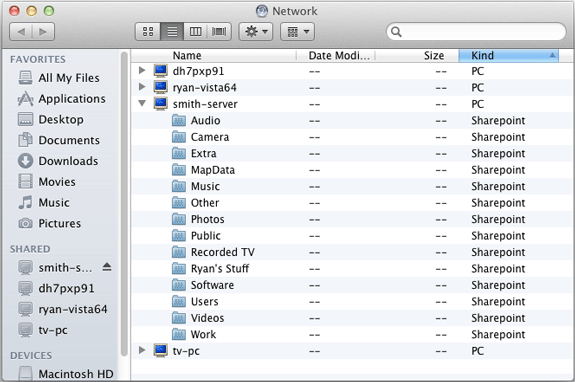Back to the Mac: OS X 10.7 Lion Review
by Andrew Cunningham, Kristian Vättö & Anand Lal Shimpi on July 20, 2011 8:30 AM ESTApple has historically used Samba, an open-source implementation of the SMB file sharing protocol, to share files with Windows machines. First included in OS X 10.2, Samba also enabled Macs to both join and host Windows-compatible directory servers, increasing the then-fledgling OS’s viability in a business setting. However, the Samba team recently began licensing the software under the GPL3 license, which prohibits its inclusion in retail products, and rather than lose these key interoperability features, Apple chose to develop its own in-house implementation for Lion. What does that mean for you, the user?
Well, for starters, Lion’s new SMB implementation is SMB 2.0 only - this is a Microsoft-developed improvement of the specification that was introduced in Windows Vista and continued in Windows 7. This has one major ramifications for Lion users, and I suspect it will only impact a fraction of a fraction of them: Lion computers can no longer be joined to NT Domain Controller directories. These directories are quite old at this point - their successor, Active Directory, came with Windows Server 2000 in 1999, and has become much more robust with each Windows Server release since - but if, for some reason, you or your business uses new or newish Macs on an ancient domain, Lion’s going to break things for you (Lion does, however, remain compatible with Active Directory).
You never want to see an OS lose features, but I can’t say I blame Apple much for making this call, and it’s not a secret that Apple has historically been much less interested in backward compatibility than Microsoft. For people who absolutely need for OS X to have this functionality, Samba is definitely still around, and I wouldn’t be surprised to see someone begin maintaining an OS X-friendly fork of the software. Just know Lion won’t do it out of the box anymore.

SMB’s main use in OS X is for file sharing with Windows users, though, and I can say that file sharing with users of both Windows XP and Windows 7 (and, by extension, Windows Vista, for what it’s worth) works just fine once you set it up in System Preferences. I was able to copy files to and from a basic share I made without issue.
Anecdotally, I can also say that connecting to and browsing through an SMB share with many files and folders feels faster than Snow Leopard does on the same system connected to the same share. In Snow Leopard, I’d often have to wait for folders with a lot of data in them to populate - in Lion, things are more or less instantaneous. SMB2 was optimized to improve speed over high-latency connections, and I’m sure that accounts for at least some of the increased snappiness.










106 Comments
View All Comments
GotThumbs - Wednesday, July 20, 2011 - link
Apple has recognized the money maker it has with its App Store (Or can we now call this an application store). I'm not a mac user and most likely never will be, but I have to say their business model works very well for squeezing income from every corner of their empire. The IOS app store has been a huge money maker (30% of every purchase adds up quickly) and now Apple is moving the same business model to its computers. Apple does have a tendancey to repackage and sell its products in various versions, but with the same underlying technology (develop once, repackage multiple times). True to form, all the apple fans will swarm around and gladly deposit their coin into the machine.GotThumbs - Wednesday, July 20, 2011 - link
Realistically, They should give away their OS to invite more users, who will then shop their true money maker....the app store. Kinda like a drug dealer would give the first taste for free. :-)ltcommanderdata - Wednesday, July 20, 2011 - link
Apple's CFO Peter Oppenheimer has already said they operate the App Store as a break even venture, ie. their 30% cut basically goes directly to operating expenses. Unless you believe their CFO is actually lying to investors at shareholder meetings in which case you should report this and your evidence to the SEC.GotThumbs - Wednesday, July 20, 2011 - link
$1,634,000,000 in revenue from Other Music Related Products and Services (3)(3) Includes sales from the iTunes Store, App Store, and iBookstore in addition to sales of iPod services and Apple-branded and third-party iPod accessories
Lets not be too naive.
ltcommanderdata - Wednesday, July 20, 2011 - link
The App Store no doubt generates revenue for Apple, but how much profit do they actually make?steven75 - Friday, July 22, 2011 - link
Please educate yourself. As much as you might think it, yuo aren't smarter than the SEC.GotThumbs - Wednesday, July 20, 2011 - link
I think ALL investors are looking for profits, and if Apple happens to turn a profit through their iTunes store (whoops), do you really think the investors will be angry about the white lie?Taft12 - Wednesday, July 20, 2011 - link
Accountants can paint a revenue picture to look any way they want it to. Look no further than "Hollywood Accounting" in the movie industry. Don't take that break even comment at face value.parlour - Monday, July 25, 2011 - link
I would call up the SEC and tell them about your great insight. If what you are saying is true Apple is in deep, deep trouble.In reality it would be stupid for Apple’s CFO to lie about something like that, not worth the trouble at all.
Puppies04 - Wednesday, July 20, 2011 - link
$1,634,000,000 just to break even! Sheesh that is some massive overhead.